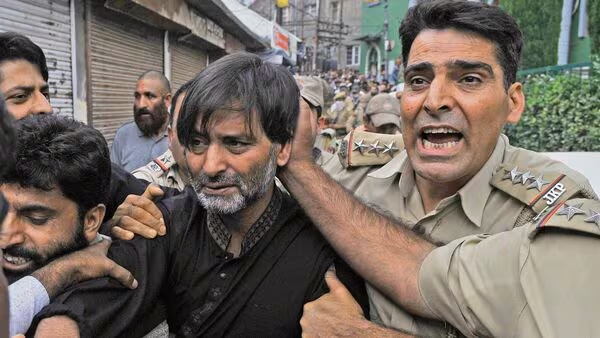
Punchline: On September 20, 2025, jailed JKLF leader Yasin Malik made sensational claims in the Delhi High Court, saying Indian intelligence arranged his meeting with Hafiz Saeed and that he also met Atal Bihari Vajpayee years earlier.
What Yasin Malik Said in Court
Yasin Malik, the jailed chief of the Jammu & Kashmir Liberation Front (JKLF), shocked everyone with his new statements in the Delhi High Court. Malik claimed that in 2006, he met Hafiz Saeed, the founder of Lashkar-e-Taiba (LeT), not secretly but on the request of India’s own Intelligence Bureau (IB). He said a senior IB officer, V.K. Joshi, told him to go ahead with the meeting when he was in Pakistan.
Malik further added that after the meeting, then Prime Minister Dr. Manmohan Singh conveyed his thanks and gratitude to him. If true, this means the meeting was part of a back-channel strategy that the public never knew about.
Malik’s Meeting with Vajpayee
Malik also revealed that he had met Atal Bihari Vajpayee in 1995. At that time, Vajpayee was already one of the tallest leaders in Indian politics. Though Malik did not share many details of what was discussed, his statement suggests that Indian governments, whether led by the BJP or the Congress, kept informal contact with Kashmiri separatist leaders.
Why These Statements Are Important
These claims are serious because they show a side of Indian politics and intelligence work that has never been openly admitted:
- Backdoor Talks: Even hardline separatist leaders and terrorists were sometimes approached for talks or peace efforts.
- Across Party Lines: Malik’s contacts with Vajpayee (BJP) and Manmohan Singh (Congress) show that leaders from different parties may have used him for their own strategies.
- Court Case Impact: Malik is serving a life sentence in a terror-funding case. His affidavit in the Delhi High Court may now be seen as an attempt to prove he was once used by the Indian state itself.
Why Hafiz Saeed Matters
Hafiz Saeed is one of India’s most wanted men, accused of planning the 2008 Mumbai terror attacks that killed 166 people. For Malik to say that Indian intelligence itself arranged his meeting with Saeed is explosive. It raises questions about what the purpose of that meeting was, and whether it was part of a peace effort, intelligence gathering, or something else.
Political Reactions
So far, the Intelligence Bureau has not given any response. But political reactions are expected to be strong. The Congress may face uncomfortable questions about what role the UPA government played in such contacts. The BJP, too, will have to explain if Vajpayee’s meeting with Malik was officially sanctioned or informal. The ruling party may also use Malik’s statement to attack its rivals.
The Bigger Picture
These claims highlight how complicated the Kashmir issue has been for India. Governments have often used secret channels and risky strategies in the hope of bringing peace. But such strategies also raise doubts: did they weaken India’s stand against terror, or did they genuinely help avoid bigger conflicts?
Malik’s claims also show how separatist leaders sometimes had more access to Indian leaders and institutions than the public ever knew. It is likely that more details will come out in the coming days.
Final Word
Yasin Malik’s affidavit has opened up a storm. Whether his claims are proved true or not, they have forced India to look back at how past governments handled Kashmir, separatists, and even terrorists like Hafiz Saeed. For now, the Delhi High Court will decide the legal importance of his words, but politically, the debate has already begun.
FOR MORE BLOGS – beyondthepunchlines.com

 Add to favorites
Add to favorites








